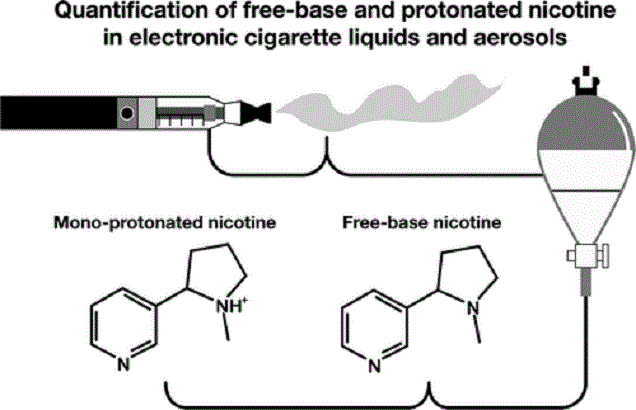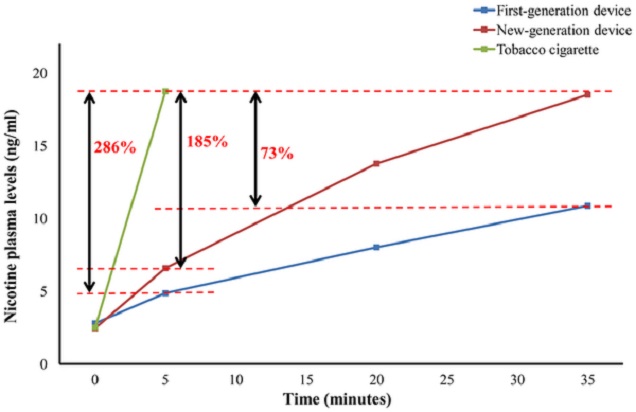
A commonly-repeated myth is that nicotine is as addictive as heroin. The CDC, as part of their apparent quest to demonize nicotine by any means necessary, states, “Research suggests that nicotine is as addictive as heroin, cocaine, or alcohol.” This, in a word, is nonsense. A recent study (or, more specifically, the press release) has also led to many claims that e-cigarettes are as addictive as tobacco cigarettes. The picture frequently painted for us is that nicotine creates the addiction to smoking, and that nicotine in itself – whether consumed by smoking or vaping – is hugely addictive.
However, there are many others who doubt this conclusion. Notably for vapers, a video by Not Blowing Smoke called “The Nicotine Misconception” makes the claim that, outside of the context of cigarette smoke, nicotine really isn’t all that addictive. Chris Price, on his E-Cigarette Politics website, has a page entitled “The Great Nicotine Myth” which goes even further, claiming:
“Nicotine, by itself, has no observed potential for dependence. That is to say, pure nicotine administered to never-smokers or never-users of tobacco in clinical trials is not demonstrated to create dependence.”
So, who is right? Is nicotine really addictive? Does the new study really show that vaping is as addictive as smoking? Here’s everything you need to know about e-cigarettes and nicotine addiction.
TL;DR
- The recent study only looked at the type of nicotine present in e-liquids and the vapor produced from them, offering no evidence about its addictiveness relative to cigarettes (or otherwise).
- Nicotine is not the only chemical in cigarette smoke that contributes to addiction, with MAOIs and other tobaccos alkaloids also having a role to play – working to enhance the effect of nicotine and thereby its addictive potential.
- For the reasons above, claims that nicotine itself (rather than smoking) is as addictive as heroin or cocaine are absurd, and are completely unsupported by evidence.
- The slower speed of nicotine delivery from e-cigarettes compared to tobacco cigarettes, the lack of MAOIs or other tobacco alkaloids, and direct evidence of dependence levels in vapers, suggest that e-cigarettes are much less addictive.
- Available evidence – although no available studies directly test the hypothesis – suggests that, outside of tobacco smoke, nicotine isn’t very addictive at all.
- In rare cases, never-smokers do develop dependence on nicotine, but evidence from studies of nicotine’s potential medicinal benefits suggests that most don’t.
The New Study – Freebase Nicotine in E-Liquids

The recent research that led to widespread claims that e-cigarettes are as addictive as tobacco cigarettes actually investigated no such thing, as Tom Pruen points out in his excellent ECITA blog post on the study. The study actually looked at the levels of freebase and protonated nicotine in various e-liquids and the vapor produced from them, and found that most of the nicotine in e-liquid and vapor was the freebase form. The researchers also proposed a method for distinguishing between the two types of nicotine, which will aid in future investigations.
The headlines appear to be solely based on the fact that the freebase form of nicotine made up the bulk of that in the liquid and vapor (aerosol, technically) produced from it. Pruen points out, though, that this is a completely expected finding, since pharmaceutical-grade nicotine (used in e-liquids) is already in freebase form, because this is the form most readily absorbed by the body. He points out that if this alone was enough to make something “as addictive as cigarettes,” then Nicorette QuickMist (which uses the same freebase nicotine) would also be as addictive as smoking.
In short, the study offers an expected finding, alongside some useful information for researchers interested in investigating the types of nicotine present in e-cigarettes. No conclusions about the addictiveness of e-cigarettes compared to those of cigarettes can be reached based on this research alone.
MYTH: “Nicotine is as Addictive as Heroin and Cocaine”

But, you may be wondering, since nicotine is addictive as heroin and cocaine, then surely e-cigarettes are still really addictive? The big problem with this statement is that it says “nicotine” instead of “smoking,” and there are many differences between the two when it comes to addictiveness.
There are many reasons for this, but the point is shown well enough by the fact that there isn’t just nicotine in cigarette smoke. Research has shown that monoamine oxidase inhibitors (MAOIs) increase the dependence-creating properties of nicotine, and these are present in cigarette smoke. Additionally, other tobacco alkaloids such as anatabine, cotinine and myosmine increase the addictiveness of nicotine – with rats showing more signs of dependence after receiving a mixture of these and nicotine than when just receiving nicotine alone. Acetaldehyde and nitric oxide in cigarette smoke have also been shown to increase the effect of nicotine.
So, if it isn’t just nicotine that makes smoking addictive, why do the CDC and others claim that nicotine is as addictive as heroin and cocaine? The CDC provides references for their statement – which is softened (on the page with references) to “Research suggests that nicotine may be as addictive as heroin, cocaine, or alcohol” – and this leads to the Surgeon General’s report.
The report does state that the “pharmacologic and behavioral processes that determine tobacco addiction are similar to those that determine addiction to drugs such as heroin and cocaine,” but this clearly isn’t the same as the CDC’s claim. Actually reading the report would have helped the CDC avoid such a blatant misrepresentation of the facts, since it says, “several lines of epidemiologic and laboratory evidence presented in this chapter indicate that tobacco-delivered nicotine is substantially more addictive than are pure nicotine forms.”
And there you have it: smoking might be considered as addictive as heroin or cocaine, but nicotine itself is clearly not, even according to their own references. The comparison between nicotine and illegal drugs has been directly addressed in animal research, too, with rats preferring cocaine to nicotine when given the choice between them. The claim – at least for pure nicotine – is completely inconsistent with the facts.
Is Vaping as Addictive as Smoking?

So the most extreme statements about nicotine’s addictiveness are actually misrepresentations of claims made about smoking, which fly in the face of the abundant evidence of significant differences between the addictiveness of smoking and that of nicotine, but what about vaping? Well, for all of the same reasons, vaping doesn’t appear to be as addictive as smoking either.
One key point raised by Tom Pruen is the speed of nicotine delivery. In Dr. Farsalinos’ study comparing the nicotine delivery from cigarettes to that from first and later-generation e-cigarettes, it was shown that the speed of nicotine delivery from even higher-quality, later-generation e-cigarettes was much slower than from smoking. It took 35 minutes of vaping to obtain the same amount of blood nicotine found after just 5 minutes of smoking.

The speed of delivery of the drug is a crucial factor in determining how addictive it is, so this is pretty compelling evidence that e-cigarettes aren’t as addictive as tobacco cigarettes. The lack of the additional chemicals that enhance nicotine’s addictive effects are even more reason to assume this to be true. Acetaldehyde is present in e-cig vapor, admittedly, but in non-dry-puff conditions, the levels are about 275 times lower than in cigarette smoke, so even though this does seem to increase the addictive potential of nicotine, its effect will be much greater in smoke than in vapor.
However, we don’t even have to use points like this to infer the difference in addictiveness between vaping and smoking, because we have more direct evidence of it. Using established tests for nicotine dependence (note that, in the absence of harm from the habit, “dependence” is technically a more accurate term than “addiction”), researchers have compared e-cigarettes to tobacco cigarettes and nicotine gums. The study found that e-cigarettes are less addictive (i.e. dependence-creating) than tobacco cigarettes, and suggests they’re probably more in line with nicotine gum in terms of addictiveness. In other words, they’re not that addictive. Other research, comparing participants’ current levels of dependence on e-cigs with their memories of addiction to tobacco cigs, has also supported this conclusion.
Overall, there is every indication that e-cigarettes are considerably less addictive than tobacco cigarettes. To make the claim that they aren’t, as the authors of the recent study did (repeated, of course, by credulous journalists), requires ignoring all other evidence and focusing only on one finding that didn’t even address addictiveness.
Is Nicotine Alone Addictive At All?

This is the really interesting question, and Chris Price points out that there have been no substantial attempts to really answer it. Because of the additional components in smoke that likely play a role in establishing addiction, he points out that the only relevant studies would be ones in which never-smokers were given pure nicotine. For smokers who’ve switched to a pure form of nicotine (such as vapers), the changes in brain chemistry assumed to be caused by starting to smoke means that there is already dependence on nicotine, so only never-smokers are likely to be relevant.
Some evidence of this type can arguably be found in trials of nicotine for its potential benefits for other conditions, such as this one looking at whether it could help with mild cognitive impairments (answer: possibly). By the end of the study, 34 non-smokers had been on 15 mg of nicotine per day in the form of patches, but none reported any withdrawal symptoms, and all stopped using the patches. Some other studies have also looked at nicotine as a potential treatment for other conditions in never-smokers with no reports of dependence. However, evidence of this type is ultimately very limited, and since none of these studies specifically set out to investigate dependence in never-smokers, it’s more like anecdotal evidence than anything.
For vaping specifically, the fact that evidence of this type is limited means we don’t have very much to work with. However, studies do indicate that vaping among never-smokers is very rare, and that almost all never-smokers who do vape don’t do so regularly. The fact that some do so regularly – albeit a very small number – suggests that it is possible, but many more try vaping, so this also indicates that nicotine isn’t particularly dependence-forming on its own. Vapers are dependent on nicotine, because smoking originally hooked us in, but this might not be as big a risk for never-smokers trying vaping.

In a study of dependence in nicotine gum users, a self-selected sample of over 400 users found just five never-smokers who chewed nicotine gum daily, and two of them had never used smokeless tobacco either. The never-smokers had been chewing the gum for longer than the ever-smokers had, and the questionnaires administered did suggest that they were dependent on the gum. They also showed classic signs of dependence, such as trying to quit chewing but failing to and experiencing withdrawal symptoms when they stopped chewing the gum for a few hours. The authors point out that a similar study was unable to find a single never-smoker addicted to nicotine gum, and provide further evidence that dependence on nicotine gum in never-smokers definitely isn’t a widespread phenomenon. They conclude, “Addiction to the nicotine gum in never smokers is probably quite rare, but this study suggests that it can occur.”
The reason it can occur is effectively the same reason addiction to other drugs occurs: it impacts on the dopamine levels in the brain. This is a simplification, but dopamine can be thought of as the brain’s “pleasure” chemical, and most addictive drugs – as well as behaviors people can get addicted to, like gambling – increase it in some way. The MAOIs in smoke prevent the removal of dopamine, which is one of the reasons nicotine in the form of smoke is more addictive than pure nicotine.
Conclusion – Nicotine Alone Isn’t Very Addictive
So, the evidence overall suggests that, far from being as addictive as heroin or cocaine, pure nicotine isn’t really particularly addictive at all. It is addictive (as we continuing vapers can attest), and there are cases of never-users of tobacco becoming addicted to it, but they’re extraordinarily difficult to find. This all suggests that the reason we don’t see many never-smokers vaping regularly is that there simply isn’t much of a motivation to continue using nicotine unless you start out by smoking. As Chris Price points out, there really isn’t any evidence addressing the core point alone – by simply giving never-smokers a source of pure nicotine to use for an extended period of time and seeing if they become dependent – so we can’t really be sure, but at very least we can say it probably isn’t all that addictive.

